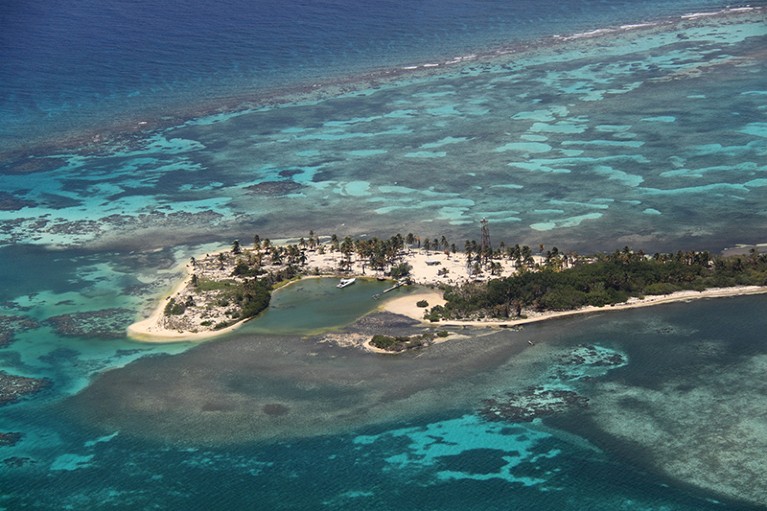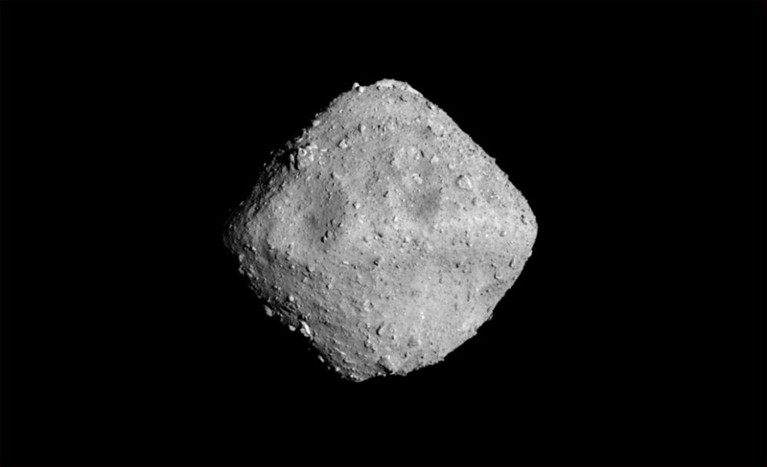EVENTS
Belize reef removed from danger list The United Nations World Heritage Committee has removed the Belize Barrier Reef Reserve System from its List of World Heritage in Danger, the group announced on 26 June. The barrier reef, the largest in the Northern Hemisphere, includes atolls, coastal lagoons and mangrove forests, and is home to several threatened marine species, such as the West Indian manatee (Trichechus manatus). The committee added the area to the list of endangered sites in 2009 following concerns about marine habitat destruction, offshore oil extraction and other issues. The decision to delist the site came as a result of conservation efforts, including a ban on oil exploration in Belize’s waters.

The Belize Barrier Reef, the world’s second largest coral-reef system, was declared to be in danger in 2009.Credit: Ian Bottle/Alamy
Climate lawsuit A US federal judge threw out a high-profile lawsuit filed against fossil-fuel companies by two California cities, according to news reports on 26 June. San Francisco and Oakland were suing several companies — including BP, Chevron, Exxon Mobil and Royal Dutch Shell — in an effort to recoup some of the costs of dealing with the adverse impacts of climate change. In a decision issued on 25 June, judge William Alsup of the federal district court in San Francisco acknowledged climate-change science, but stated that the issue should be addressed by the government’s executive branch and Congress, not the courts. The decision raises questions about similar lawsuits filed by other local governments across the United States.
RESEARCH
Misconduct inquiry The Karolinska Institute in Stockholm has declared seven researchers responsible for scientific misconduct in a case involving six research articles co-authored by disgraced thoracic surgeon Paolo Macchiarini. It says that Macchiarini, who transplanted synthetic windpipes into three patients at the Karolinska University Hospital between 2011 and 2013, held ultimate responsibility for the papers. The institute’s investigation found that the studies included “fabricated and distorted descriptions of the patients’ conditions”. The experimental procedures failed. The president of the Karolinska Institute, Ole Petter Ottersen, has called for the papers to be retracted. The outcome overturns a 2015 decision from an investigation under the previous president, which stated that Macchiarini had not committed misconduct in these papers. The institute said in a press release on 25 June that a further 31 co-authors are “blameworthy for their contributions” to the articles, but not guilty of misconduct. Another five co-authors were cleared of all blame.
FACILITIES
Equipment damaged Two of the world’s most-powerful electron microscopes sustained significant damage when a magnitude-6.1 earthquake hit the Japanese coastal city of Osaka on 18 June. The event killed 3 people and injured more than 200. Hidehiro Yasuda, director of Osaka University’s Research Center for Ultra-High Voltage Electron Microscopy, told Japanese media last week that the quake damaged the circuits and high-voltage tank of the centre’s 12-metre-high H3000 ultra-high-voltage electron microscope, one of the world’s largest electron microscopes. Also damaged was the centre’s materials- and bio-science electron microscope, which is used to study biological material. Yasuda said that research programmes that use the equipment could be affected for at least a year.
ENVIRONMENT
Lost trees Tree cover equivalent to nearly 16 million hectares of forest disappeared across the tropics in 2017, marking the second-worst year for such loss on record, according to a 26 June announcement from Global Forest Watch, an environmental group based in Washington DC. The organization used new satellite data from the University of Maryland in College Park for their analysis. Likely causes for the destruction include forest fires in the Brazilian Amazon and an increase in deforestation in Colombia. Hurricanes wiped out trees in the Caribbean, and agriculture, charcoal production and logging drove losses in the Democratic Republic of the Congo.
SPACE
Rocky rendezvous Japan’s Hayabusa-2 spacecraft has arrived at the asteroid Ryugu (pictured), kicking off a year and a half of exploration that will culminate with the return of rock samples to Earth. The Japan Aerospace Exploration Agency said on 27 June that the probe had reached its ‘rendezvous’ with the 1-kilometre-wide asteroid, after its chemical thrusters performed a series of automated braking burns. Hayabusa-2 is now hovering 20 kilometres above Ryugu, preparing to release four landers and to make a series of touchdowns itself. If all goes to plan, the mission will be the second — after its predecessor, Hayabusa — to return an asteroid sample to Earth.

The square-shaped asteroid Ryugu is the target of a Japanese sample-return mission.Credit: Jaxa, Univ. Tokyo and collab.
POLICY
Three-person IVF A group of Australian politicians has released a road map for the country to move towards legalizing mitochondrial donation. The group’s recommendations, published on 27 June, include that the government consult the public and scientific experts about permitting clinical use of the reproductive technology, which could help women avoid passing genetic defects to their children through mutations in cellular organelles called mitochondria. The technique uses a healthy donor egg to create an embryo with the nuclear DNA of two people and the mitochondrial DNA of the healthy egg. The embryo can then be implanted using in vitro fertilization (IVF). The United Kingdom is currently the only country to specifically allow the technology. The group of conditions called mitochondrial disease affects as many as one in 500 children, and symptoms range from mild to severely debilitating and life-threatening, affecting many systems in the body.
Weapons watch The world’s chemical-weapons watchdog now has the authority to attribute responsibility for chemical attacks. The Organisation for the Prohibition of Chemical Weapons (OPCW) implements the Chemical Weapons Convention, which bans the production and use of such arms. Until now, the body could provide independent laboratory confirmation of the chemical used in an attack, but could not attribute a likely origin. After a resurgence in chemical-weapons attacks in Syria in the past few years, however, the OPCW has increasingly taken on investigative tasks, and, on 27 June, most of the convention’s member states voted in favour of expanding its power. To carry out its new role, the OPCW will need to increase its infrastructure and forensics capacity, which will help it to build up ‘signatures’ of chemical components and provide investigators with clues about where the chemicals were made — and by whom. The organization, based in The Hague, the Netherlands, also oversees and verifies the destruction of existing weapons stockpiles worldwide, and monitors the chemical industry to prevent the production of new ones.
Red-wolf plans US officials have announced plans to allow the killing of up to two dozen endangered red wolves (Canis rufus). On 27 June, the US Fish and Wildlife Service proposed draft regulations that would limit the animals’ habitat to federal land in two North Carolina counties and lift restrictions on killing any wolves that strayed from that territory. About 40 red wolves are left in the wild — all in eastern North Carolina — with roughly 200 more in captive breeding facilities around the United States. The proposal is open for public comment until 30 July, and the agency will hold a public hearing on the plan in Manteo, North Carolina, on 10 July. The regulations, if approved, would come into effect in November.
PEOPLE
Biologist resigns An internal investigation by the University of California, Irvine (UCI), has substantiated sexual-harassment claims against evolutionary biologist Francisco J. Ayala, according to a 28 June statement from UCI chancellor Howard Gillman. Ayala, a prominent donor to UCI whose name was on the School of Biological Sciences, resigned from the university, effective 1 July. Gillman announced that UCI would remove Ayala’s name from the biology department, the science library and various programmes that bear his name. In a statement, Ayala said that it was never his intent to make his colleagues uncomfortable. The claims that prompted the current investigation were not the first, says Micha Liberty, an attorney representing three of the four women involved in the matter. The university received an official complaint against Ayala three years ago, she says.
TREND WATCH
Pharmacological cognitive enhancement — the non-medical use of stimulant drugs to increase concentration or memory during work or while studying — is rising around the world, a survey of more than 100,000 people suggests. Between 2015 and 2017, the number of people who reported using illegal drugs or prescription medications for this purpose increased in all 15 nations surveyed. The most commonly used prescription drugs include modafinil, Adderall and Ritalin (methylphenidate).

Source: L. J. Maier et al. Int. J. Drug Policy 58, 104–112 (2018)



